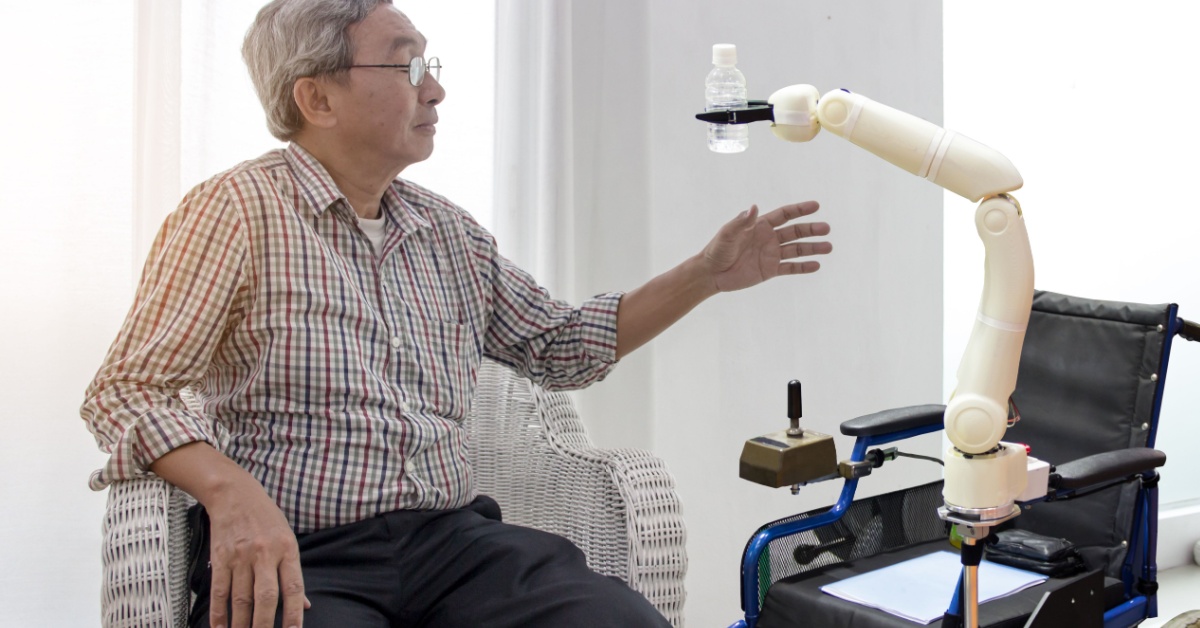The Impact of Artificial Intelligence on Nursing

When we consider the future, it’s hard to imagine just how much the way we live and work could change as a result of AI innovations. Artificial intelligence is poised to shape the future of nearly every industry and profession—and nursing is no exception.
Artificial intelligence in nursing is allowing nurses to deliver care that is more personalized, more efficient, and more evidence-based. Faster, clearer data analysis, task automation, remote patient monitoring, and telehealth availability are just a few examples of artificial intelligence in nursing, and the technology is only getting started.
Today’s nurses will lead and influence on how to most effectively incorporate AI into their day-to-day practice. Tomorrow’s nurses will be educated on AI best practices in their nursing school programs.
In celebration and recognition of how the nursing field continues to shape evolving technologies, let’s take a look at how AI is already reshaping the nursing landscape and what we can expect to happen next.
How are nurses already using AI?
To put it simply, nurses are using AI to care for patients in a data-centric, deeply informed and personalized way that was never before possible. They are relying on AI insights for faster, more efficient, and more evidence-based practice in the field. But how does that break down practically?
AI is already being widely used in hospitals and other healthcare settings. Examples of artificial intelligence in nursing include:
Natural language processing (NLP) tools
This software transforms the data from unstructured clinical documentation (think: scribbled physician’s notes and patient histories) into comprehensive, easy-to-follow narratives that highlight the most relevant information. NLP empowers nurses with information that could otherwise be lost or overlooked. In the studies performed in the clinical setting, NLP has already proved helpful in early diagnosis, disease prevention, and treatment support.
Remote-monitoring devices
These devices allow the healthcare setting to expand its reach into patients’ homes, workplaces and even travel. These devices, often called “wearables,” can track how well a patient is adhering to their treatment plan as well as keep records of vital signs and symptoms. Nurses receive notifications on patient progress and possible concerns, even when their patients are on the move.
Robotics and automation
AI is bringing automation to so many everyday nursing tasks. Artificial-intelligence-powered robotics can administer medications, assist in lifting and transporting patients, and can even be used to disinfect hospital rooms. These innovations can offload some of the administrative burden of nursing, reduce the risk of workplace injuries, improve efficiency, and allow nurses to focus their energy on the most human components of care.
Data analysis and informatics
Nurses trained in healthcare informatics and quality improvement can use AI to analyze complex healthcare data to drive evidence-based practice decisions. The amount of medical literature and evidence-based insights available to healthcare professionals is not only massive, it is growing at a rate it has never grown before. Informatics tools are meant to help nurses evaluate the success of different healthcare interventions, strategize thoughtfully, and gain high-level insight into care delivery.
Clinical decision support systems (CDSS)
These powerful systems take a wide range of data—including lab test results, medical histories, and vital signs—to make evidence-based recommendations at the actual point of care. CDSS is not meant to replace a nurse’s clinical judgment but to support the nurse with predictive information and pattern recognition. The interventions suggested are designed to help nurses and other medical professionals make choices that will have the best clinical outcome.
How are nursing students being trained to use AI?
The potential of AI’s use in health care is developing so quickly that it can be challenging to design coursework that will be most relevant for tomorrow’s nurses. High-quality nursing programs are rising to this challenge by focusing on delivering training and information that will best equip future nurses, no matter what the future holds.
Coursework
Training to use artificial intelligence in nursing starts in the classroom. Whether you attend an online program or learn in person, courses are being adapted to cover these topics. Predictive analytics, clinical decision support systems, and telehealth best practices are some of what nurses are learning about from engaged, up-to-date faculty.
Ethics modules
Artificial intelligence in nursing is exciting—but it does present a host of legal and ethical questions for nurses to wrestle through. In-class conversations about these dilemmas, group projects, and presentations from leaders in the fields of medicine, law, and AI are crucial for nurses who are training on these technologies.
Virtual reality and simulators
Some nursing schools are already offering patient simulations and other virtual reality training powered by AI. These modules are designed to let students practice interactions in hypothetical environments in a way that looks and feels real. In these cases, future nurses can use AI to practice interact with the simulation as well as to actually practice with the AI-tools that nurses use.
Clinical hours and in-person learning
All nursing students are required to complete clinical hours in person in the healthcare setting. These hours are crucial to the development of nurses-in-training as they learn from experienced nurses and faculty. Artificial intelligence tools are part of what students train to use during their clinical hours.

Can nurses ever be replaced by AI?
AI has the potential to dramatically change care delivery models. The technology can automate routine tasks and offer evidence-based advice, and it will likely improve efficiency and consistency of care across the industry.
However, AI will not replace the need for nurses altogether. Nurses are valuable not just because of the standard of care they can offer and interventions they know how to do, but because of the way that they actually care about patients. Nurses possess empathy, intuition, and dynamic problem-solving skills. Many are in the field because of the opportunity it presents to make a real difference in people’s lives.
Nurses can speak comforting words and offer human hands. That’s not something that no technology, no matter how innovative and exciting, can replace. Nurses have long brought humanity to healthcare and will continue to do so long into the future. They’ve always been the ones making a difference in patients’ lives—and that’s not going to change.
How can online programs address and incorporate AI in nursing education?
Online programs are perfectly positioned to educate the next generation of nurses on artificial intelligence. One might even argue that it has never made more sense to study nursing online, as much of the technology that delivers an online education is the same technology that nurses will be relying on in the field.
Wilkes University’s Passan School of Nursing has designed its online nursing programs to be adaptable, innovative, and future-focused. Coursework is available in a virtual learning environment 24 hours a day, and faculty mentors are highly invested in the success of every student. Wilkes is committed to helping nurses develop personally and professionally, and that includes delivering a cutting-edge education that includes artificial intelligence. Wilkes also offers their online students clinical placement services to ensure that they can put these tools to use in the field.
Regardless of where you are in your professional journey, Wilkes has an online nursing school option for you. Click on one of the program links below to learn more.




